1.The Cock and the Pearl (公鸡和珍珠)
 1.The Cock and the Pearl (公鸡和珍珠)
1.The Cock and the Pearl (公鸡和珍珠) 
A cock was once strutting up and down the farmyard among the hens when suddenly he espied something shinning amid the straw. |
| 有一次,一只公鸡在农家院子的母鸡群里昂胸阔步的走着,突然,它发现在柴禾堆儿里有个东西在闪闪发光。 |
"Ho! ho!" quoth he, "that's for me," and soon rooted it out From beneath the straw. |
| 公鸡说:“哦,哦! 这个是我的”。 于是,它很快从稻草下面捡起来, |
What did it turn out to be but a Pearl that by some chance had been lost in the yard? |
| 这是一颗珍珠啊!是谁不小心丢的呢?。 |
"You may be a treasure," quoth Master Cock, "to men that prize you, but for me I would rather have a single barley-corn than a peck of pearls." |
| 接着公鸡对着它说:“对人来说你是一个宝贝,但对我而言,我宁可你是一粒米而不是珍珠”。 |
Precious things are for those that can prize them. |
| 故事是说:对人来讲,东西之所以珍贵是因为人知道它的价值。 |
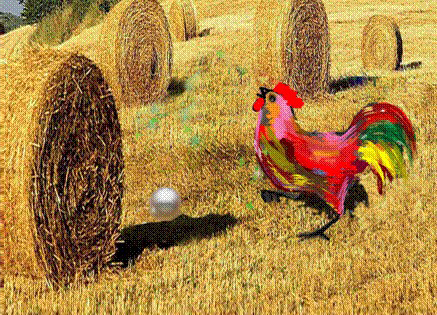 |
2.The Wolf and the Lamb (狼和小羊)
 2.The Wolf and the Lamb (狼和小羊)
2.The Wolf and the Lamb (狼和小羊) 
Once upon a time a Wolf was lapping at a spring on a hillside, |
在很久以前,有一只狼正在山的泉水边舐水喝, |
when, looking up, what should he see but a Lamb just beginning to drink a little lower down. |
当它抬起头时,看见一只小羊在不远的下游正要喝水。 |
"There's my supper," thought he, "if only I can find some excuse to seize it." |
它在想,如果我能找到什么借口就把它抓住,我就会吃到一顿美餐。 |
Then he called out to the Lamb, "How dare you muddle the water from which I am drinking?" |
于是,狼对着小羊嚷着说:“你怎么能把水弄脏,使我喝不到干净的泉水呢?”。 |
"Nay, master, nay," said Lambikin; "if the water be muddy up there, I cannot be the cause of it, for it runs down from you to me." |
小羊说:“不是的!主人,这水是从你那里流过来的,我根本不可能会弄脏水。 |
"Well, then," said the Wolf, "why did you call me bad names this time last year?" |
狼接着又说:“那你去年为什么骂我?” |
"That cannot be," said the Lamb; "I am only six months old." |
小羊说:“怎么可能呢?我现在只有六个月大”。 |
"I don't care," snarled the Wolf; "if it was not you it was your father;" |
狼咆哮着说:“我不管,如果不是你,就是你爸爸”。 |
and with that he rushed upon the poor little Lamb and.WARRA WARRA WARRA WARRA WARRA ate her all up. But before she died she gasped out "Any excuse will serve a tyrant." |
狼说着就冲向可怜的小羊,把它咬住大口大口地吃了。小羊临死前喊叫:“欲加之罪,何患无词。” |
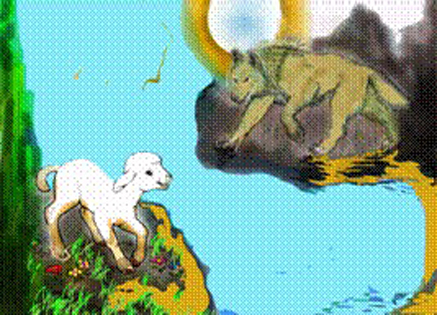 |
3.The Dog and the Shadow (狗和影子儿)
 3.The Dog and the Shadow (狗和影子儿)
3.The Dog and the Shadow (狗和影子儿) 
It happened that a Dog had got a piece of meat and was carrying it home in his mouth to eat it in peace. |
从前,一只狗得到了一块儿肉。它叼着肉想回到家后再细嚼慢咽。 |
Now on his way home he had to cross a plank lying across a running brook. As he crossed, |
回家的途中,要经过一座木桥。桥下面有流动的溪水。当它正要通过时, |
he l ooked down and saw his own shadow reflected in the water beneath. |
它低头看见水中自己的影子儿。 |
Thinking it was another dog with another piece of meat, he made up his mind to have that also. |
它以为是另外的一只狗叼着肉,所以就打定主意要把肉抢过来。 |
So he made a snap at the shadow in the water, but as he opened his mouth the piece of meat fell out, dropped into the water and was never seen more. |
它对水中的影子儿猛咬了过去,可是当它张开嘴巴时,口里的肉却掉进水里消失了。 |
Beware lest you lose the substance by grasping at the shadow. |
故事是说:谨记,不要追逐幻影而丢失已有的东西。 |
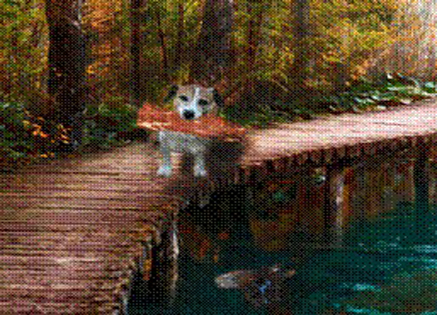 |
4.The Lion's Share (狮子的分配)
 4.The Lion's Share (狮子的分配)
4.The Lion's Share (狮子的分配) 
The Lion went once a-hunting along with the Fox, the Jackal, and the Wolf. |
有一次狮子、狐狸、狐狼和狼一起去打猎。 |
They hunted and they hunted till at last they surprised a Stag, and soon took its life. |
它们不停的追逐猎物,直到最后终于逮到一只受惊吓的公鹿。它们很快的把它咬死了。 |
Then came the question how the spoil should be divided. |
但随之而来的问题是猎物怎么分配呢? |
"Quarter me this Stag," roared the Lion; so the other animals skinned it and cut it into four parts. |
狮子吼叫着说:“这只鹿的四分之一是我的”。 于是其它动物剥掉鹿皮,把鹿分成四份儿。 |
Then the Lion took his stand in front of the carcass and pronounced judgment: The first quarter is for me in my capacity as King of Beasts; |
然后,狮子站在鹿的尸体旁边宣布:“第一份儿是我的,因为我是万兽之王; |
the second is mine as arbiter; another sharecomes to me for my part in the chase; |
第二份儿也是我的,因为我是裁判员;我参加了打猎,所以,第三份也归我。 |
and as for the fourth quarter, well, as for that, I should like to see which of you will dare to lay a paw upon it." |
至于第四份儿吗?对于这个,呵呵⋯⋯!我倒要看看,你们哪个敢用爪子碰它”。 |
"Humph," grumbled the Fox as he walked away with his tail between his legs; but he spoke in a low growl |
哼⋯⋯ 狐狸挟着尾巴无奈的走开了。但它愤怒地小声说:“我付出劳动,却得不到相应的报酬”。 |
"You may share the labours of the great,but you will not share the spoil." |
故事是说:与强者只有共苦的份儿,却没有同甘的权利。 |
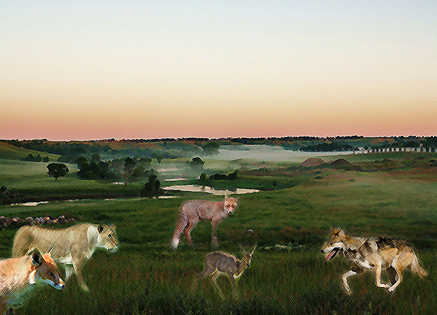 |
5.The Wolf and the Crane (狼和鹤)
 5.The Wolf and the Crane (狼和鹤)
5.The Wolf and the Crane (狼和鹤) 
A Wolf had been gorging on an animal he had killed, when suddenly a small bone in the meat stuck in his throat and he could not swallow it. |
| 一只狼正在吞吃刚抓到的猎物。突然有一块儿骨头卡在喉咙里,咽不进去也吐不出来, |
He soon felt terrible pain in his throat, and ran up and down groaning and groaning and seeking for something to relieve the pain. |
| 它马上感觉到喉咙里钻心的疼痛,它上窜下跳呻吟着四处寻求什么能让它减轻痛苦。 |
He tried to induce every one he met to remove the bone. "I would give anything," said he, "if you would take it out." |
| 它试图劝服每一个碰到的人能帮它把骨头弄出来,它说:“如果你能把骨头弄出来,我什么都可以给你”。 |
At last the Crane agreed to try, and told the Wolf to lie on his side and open his jaws as wide as he could. |
| 在最后,有只鹤同意试试看。它让狼侧身躺着,将嘴巴尽量张大, |
Then the Crane put its long neck down the Wolf's throat, and with its beak loosened the bone, till at last it got it out. |
| 然后,鹤把喙伸到狼的喉咙里,用嘴啄住了骨头,将它取了出来。 |
"Will you kindly give me the reward you promised?" said the Crane. |
| 鹤对狼说:“请按照您的承诺给我奖励吧”! |
The Wolf grinned and showed his teeth and said: "Be content. You have put your head inside a Wolf's mouth and taken it out again in safety; that ought to be reward enough for you." |
| 这只狼呲牙咧嘴的嘲笑道:“你就知足吧,你刚才把头放进我的嘴里,能平安无恙地出来,这就是足够的奖励了。” |
Gratitude and greed go not together. |
| 故事是说:贪婪的人不会有感恩之心。 |
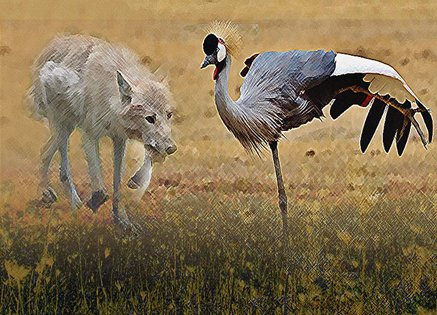 |
6.The Man and the Serpent (人和蛇)
 6.The Man and the Serpent (人和蛇)
6.The Man and the Serpent (人和蛇) 
A Countryman's son by accident trod upon a Serpent's tail, which turned and bit him so that he died. |
| 一个乡下人的儿子不小心踩到了一条蛇的尾巴,蛇立即转身咬死了这个孩子。 |
The father in a rage got his axe, and pursuing the Serpent, cut off part of its tail. |
| 他父亲在愤怒之下拿着斧头找到蛇,砍掉了它的尾巴。 |
So the Serpent in revenge began stinging several of the Farmer's cattle and caused him severe loss. Well, the Farmer thought it。 |
| 之后,蛇为了报复农夫去咬他的牛,导致农夫损失惨重。随后,农夫就想, |
best to make it up with the Serpent, and brought food and honey to the mouth of its lair, |
| 最好的方法是与蛇和好。所以农夫带了食物和糖果等礼物到它的住处。 |
and said to it: "Let's forget and forgive; perhaps you were right to punish my son, and take vengeance on my cattle, but surely I was right in trying to revenge him; |
| 他对蛇说:“让我们忘记过去并彼此饶恕吧;也许你对我儿子的惩罚和对牛群的报复是对的, 但我为儿子报仇也是对的。既然大家都各有所为, |
now that we are both satisfied why should not we be friends again?" |
| 现在倒不如让我们再成为朋友吧?” |
"No, no," said the Serpent; "take away your gifts; you can never forget the death of your son, nor I the loss of my tail." |
| 蛇回答说:“不、不,将你的礼物拿走,你永远忘不了你儿子的死,我也无法忘记我失去的尾巴”。 |
Injuries may be forgiven, but not forgotten. |
| 故事是说:伤害可以原谅,但不可忘掉。 |
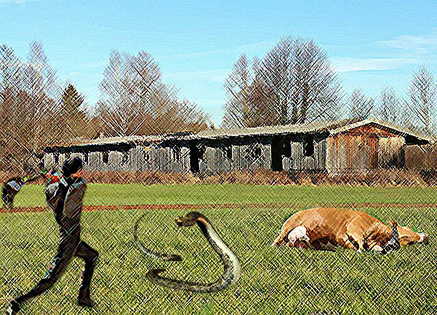 |
7.The Town Mouse and the Country Mouse (城里老鼠和乡下老鼠)
 7.The Town Mouse and the Country Mouse (城里老鼠和乡下老鼠)
7.The Town Mouse and the Country Mouse (城里老鼠和乡下老鼠) 
Now you must know that a Town Mouse once upon a time went on a visit to his cousin in the country. |
| 有一次,一只城里的老鼠去看望乡下的表弟, |
He was rough and ready, this cousin, but he loved his town friend and made him heartily welcome. |
| 这个表弟虽然很粗俗,却很爱这位城里的表哥并由衷的欢迎接待它。 |
Beans and bacon, cheese and bread, were all he had to offer, but he offered them freely. |
| 它拿出了所有的好东西,如各种豆子、熏肉、奶酪和面包,让表哥尽情享受。 |
The Town Mouse rather turned up his long nose at this country fare, and said: "I cannot understand, Cousin, how you can put up with such poor food as this, |
| 城里老鼠很不屑地说:“表弟,我真不明白,你怎么能够受得了这么差的食物? |
but of course you cannot expect anything better in the country; come you with me and I will show you how to live. |
| 当然,在乡下你也不能期望过高,跟我去城里吧,让我告诉你什么才是生活, |
When you have been in town a week you will wonder how you could ever have stood a country life." |
| 只要你到城里住上一个星期,你就会奇怪竟然还能忍受着乡下的生活。 |
No sooner said than done: the two mice set off for the town and arrived at the Town Mouse's residence late at night. |
| 不久之后,两只老鼠就离开乡下连夜赶到城里老鼠的家。 |
"You will want some refreshment after our long journey," said the polite Town Mouse, |
| 城里老鼠很有礼貌的说:“长途跋涉之后你一定饿了吧?” |
and took his friend into the grand dining-room. There they found the remains of a fine feast, and soon the two mice were eating up jellies and cakes and all that was nice. |
| 然后把它带到豪华餐厅。这里刚刚举行了一场盛宴,还有不少剩饭。一会儿功夫,两只老鼠就吃完了果冻、蛋糕和其它好吃的食物。 |
Suddenly they heard growling and barking. "What is that?" said the Country Mouse. "It is only the dogs of the house," |
| 忽然传来一阵怒吠咆哮声。乡下老鼠问:“那是什么?”城里老鼠回答:“哦,是这个家的几只狗”。 |
answered the other. "Only!" said the Country Mouse."I do not like that music at my dinner." |
| 乡下老鼠反问道:“只是几只狗?我可不喜欢吃饭的时侯听到这种‘音乐’ ”。 |
Just at that moment the door flew open, in came two huge mastiffs, and the two mice had to scamper down and run off. "Good-bye, Cousin," said the Country Mouse, "What! going so soon?" said the other. |
| 话刚说完,门被撞开了,两只大狗冲了进来,老鼠们不得不放下食物,落荒而逃。乡下老鼠边跑边说:“再见吧,表哥!”。另一只老鼠说:“什么!你这么快就要走?” |
"Yes," he replied;"Better beans and bacon in peace than cakes and ale in fear." |
| 乡下老鼠回答说:“是的,在平静中享受豌豆和熏肉还有不少美食剩下。 |
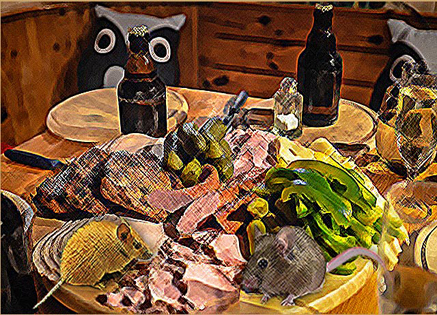 |
8.The Fox and the Crow (狐狸和乌鸦)
 8.The Fox and the Crow (狐狸和乌鸦)
8.The Fox and the Crow (狐狸和乌鸦) 
A Fox once saw a Crow fly off with a piece of cheese in its beak and settle on a branch of a tree. |
| 一次,一只狐狸看见飞来一只嘴里叼着奶酪的乌鸦停在树枝上。 |
"That's for me, as I am a Fox," said Master Reynard, |
| 狐狸自言自语道:“这个是归我的,因为我是狐狸”。 |
and he walked up to the foot of the tree. |
| 于是他走到这棵树底下。 |
"Good-day, Mistress Crow," he cried. "How well you are looking to-day: how glossy your feathers; how bright your eye. |
| 他喊道“早安!乌鸦夫人,你今天看起来很好,你的羽毛是如此的有光泽,你的眼睛也很明亮。 |
I feel sure your voice must surpass that of other birds, just as your figure does; |
| 我相信你的歌喉也会超过所有的鸟,就像你的身材那么美妙。 |
let me hear but one song from you that I may greet you as the Queen of Birds." |
| 让我听你唱一首歌,我要象向百鸟之后般的向你致敬”。 |
The Crow lifted up her head and began to caw her best, |
| 乌鸦抬起了头,开始放声高歌, |
but the moment she opened her mouth the piece of cheese fell to the ground, only to be snapped up by Master Fox. |
| 但就在这一刻,她口中的奶酪掉在了地上, 狐狸马上一抢而去。 |
"That will do," said he. "That was all I wanted. In exchange for your cheese I will give you a piece of advice for the future. |
| 狐狸说:“行了,这就是我想要的”。为了报答你的奶酪,我给你未来一句忠告。 |
"Do not trust flatterers." |
| 不要相信阿谀奉承者 |
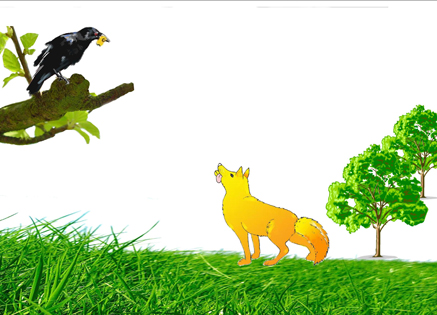 |
9.The Sick Lion (生病的狮子)
 9.The Sick Lion (生病的狮子)
9.The Sick Lion (生病的狮子) 
A Lion had come to the end of his days and lay sick unto death at the mouth of his cave, gasping for breath. |
| 一只生病的狮子躺在它的洞穴口,呼吸很困难,生命快要走到了尽头。 |
The animals, his subjects, came round him and drew nearer as he grew more and more helpless. |
| 曾经臣服于它的动物,看到狮子越来越虚弱无助时,纷纷从四处聚拢过来,围绕着狮子。 |
When they saw him on the point of death they thought to themselves: "Now is the time to pay off old grudges." |
| 它们看到狮子就要死了,心里就想:“现在是算老帐的时候了”。 |
So the Boar came up and drove at him with his tusks; then a Bull gored him with his horns; |
| 于是,野猪先走过来,用它的獠牙推搡狮子。接着,公牛用角撞它。 |
still the Lion lay helpless before them: so the Ass, feeling quite safe from danger, came up, and turning his tail to the Lion kicked up his heels into his face. |
| 狮子还是没有反应,仍旧无助的躺着,于是一头驴在确认没有危险后,走上来转身用蹄子踢狮子的脸。 |
"This is a double death," growled the Lion. |
| “这真是祸不单行啊”,狮子咆哮着死去。 |
Only cowards insult dying majesty. |
| 故事是说:只有懦夫才会凌辱垂死的英雄 |
 |
10.The Ass and the Lapdog (驴和宠物狗)
 10.The Ass and the Lapdog (驴和宠物狗)
10.The Ass and the Lapdog (驴和宠物狗) 
A Farmer one day came to the stables to see to his beasts of burden: among them was his favourite Ass, that was always well fed and often carried his master. |
| 一天,一个农夫到马厩看牲畜,马厩里有他最喜欢的驴。因为主人常常骑它,所以,驴被饲养的很肥壮。 |
With the Farmer came his Lapdog, who danced about and licked his hand and frisked about as happy as could be. |
| 跟在农夫身后的是一条小狗,小狗喜欢舔农夫的手,并且蹦蹦跳跳的快乐无比 。 |
The Farmer felt in his pocket, gave the Lapdog some dainty food, |
| 农夫伸手到口袋里,抓出零食给小狗儿吃。 |
and sat down while he gave his orders to his servants. The Lapdog jumped into his master's lap, and lay there blinking while the Farmer stroked his ears. |
| 农夫坐下给雇工发命令时,小狗儿跳到主人的大腿上, 眨着眼睛让主人抚摸它的耳朵。 |
The Ass, seeing this, broke loose from his halter and commenced prancing about in imitation of the Lapdog. |
| 驴看到了,就挣脱了缰绳,开始模仿小狗的样子跳跃着 。 |
The Farmer could not hold his sides with laughter, so the Ass went up to him, and putting his feet upon the Farmer's shoulder attempted to climb into his lap. |
| 农夫忍不住的笑起来,驴子便走到农夫那里提起前蹄,放在农夫的肩头上并试图爬到农夫的腿上。 |
The Farmer's servants rushed up with sticks and pitchforks and soon taught the Ass that . |
| 农夫的雇工们连忙用木棒和干草耙子驱赶它。于是,驴便从中明白到, |
Clumsy jesting is no joke. |
| 不得体的玩笑开不得。 |
 |